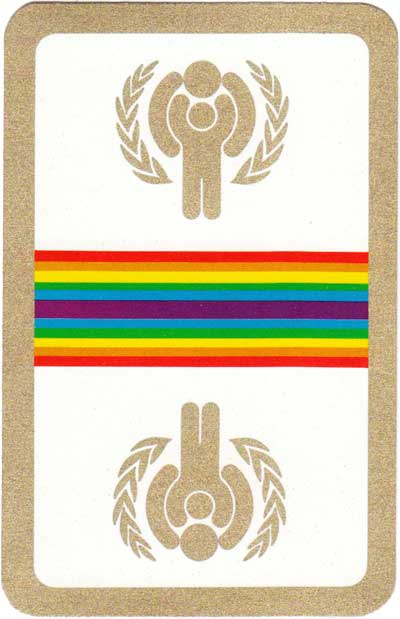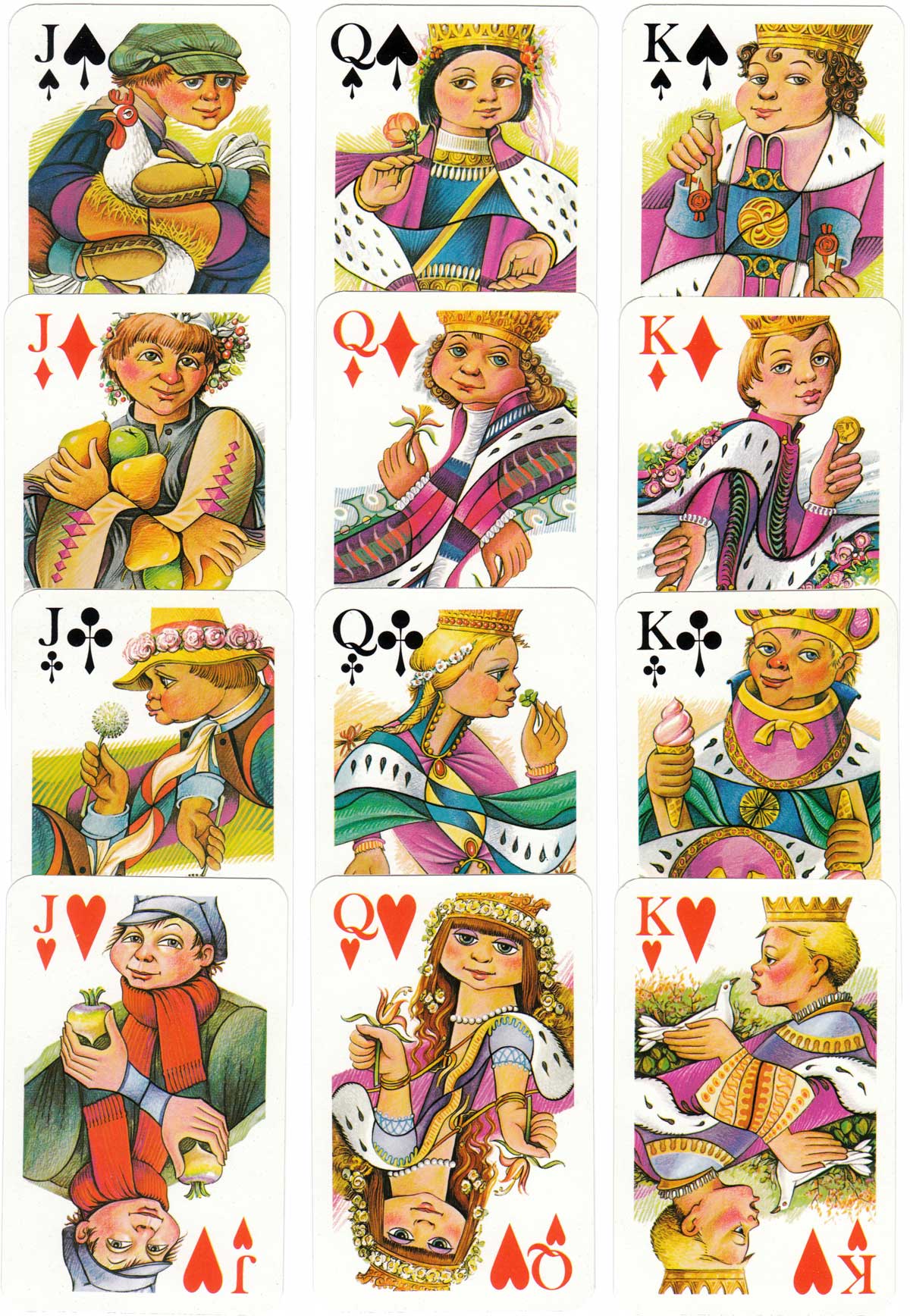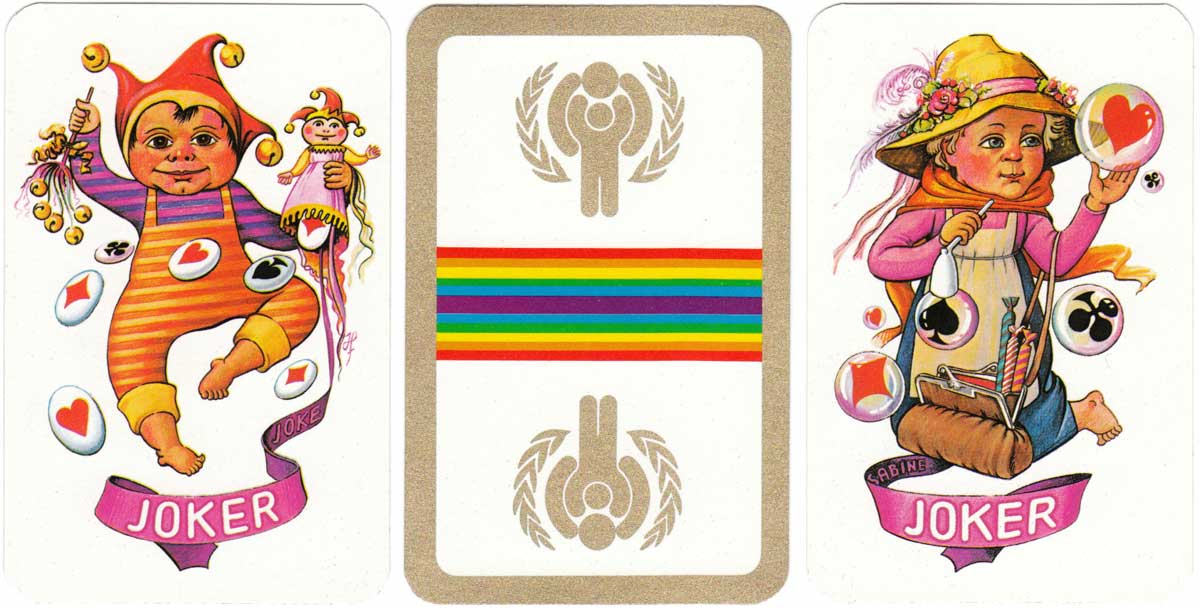Year of the Child
Year of the Child commemorative deck designed by Jhan Paulussen, 1979.

Year of the Child commemorative deck beautifully designed by visual artist Jhan Paulussen (1921-2005) and published by Turnhout Wereldcentrum van de Speelkart in 1979.
UNESCO declared 1979 as the International Year of the Child to celebrate the twentieth anniversary of the Declaration of the Rights of the Child. Children's rights are a subset of human rights with particular attention to protection and care. The images on the cards evoke the happy play-world of the child, where dream and reality intertwine, as in a fairy tale. The deck also seeks to raise awareness that many children are vulnerable, living in poverty and misery, lacking care and love or separated from their parents.
The artist’s message is: “Let the children, children be”... more►


Above: Year of the Child (De Gelukskinderen) commemorative deck designed by Jhan Paulussen, produced by Carta Mundi for Turnhout Wereldcentrum van de Speelkart, 1979. 52 cards + 2 Jokers + extra card in box.
Further References
About Jhan Paulussen►
Wikipedia: Jhan Paulussen►

By Rex Pitts (1940-2021)
Member since January 30, 2009
Rex's main interest was in card games, because, he said, they were cheap and easy to get hold of in his early days of collecting. He is well known for his extensive knowledge of Pepys games and his book is on the bookshelves of many.
His other interest was non-standard playing cards. He also had collections of sheet music, music CDs, models of London buses, London Transport timetables and maps and other objects that intrigued him.
Rex had a chequered career at school. He was expelled twice, on one occasion for smoking! Despite this he trained as a radio engineer and worked for the BBC in the World Service.
Later he moved into sales and worked for a firm that made all kinds of packaging, a job he enjoyed until his retirement. He became an expert on boxes and would always investigate those that held his cards. He could always recognize a box made for Pepys, which were the same as those of Alf Cooke’s Universal Playing Card Company, who printed the card games. This interest changed into an ability to make and mend boxes, which he did with great dexterity. He loved this kind of handicraft work.
His dexterity of hand and eye soon led to his making card games of his own design. He spent hours and hours carefully cutting them out and colouring them by hand.
Related Articles

Modern Swiss-German Pattern (carta.media)
Modernizing tradition: balancing clarity and continuity in regional card design.

Tactics Design
Late modernist Japanese playing cards designed by Masayoshi Nakajo for Tactics Design.

Shin-Tōmei Expressway Opening Commemoration
Promotional playing cards for the Shin-Tōmei Expressway, a major Japanese expressway that opened in ...

Nimbus playing cards
Mike Steer’s weather-themed pack with suits in four colours and backs for cardistry.

The Decadent Deck
Studies in the eroticism of the female body by Inge Clayton.

Historic Shakespeare
“Historic Shakespeare” playing cards featuring Shakespearean characters by Chas Goodall & Son.

Sunday Night / Nichiyoubi no Yoru
An irreverent, avant-garde deck unofficially titled "Nichiyoubi no Yoru" (Sunday Night), designed by...

Emilio Tadini playing cards
Beautiful dreamlike playing card designs by Emilio Tadini.

Zürcher Festspiel 1903
Swiss-suited pack designed by Robert Hardmeyer featuring figures from art and politics.

An Anonymous Belgian Transformation Pack
Anonymous Belgian transformation pack borrowing many images from earlier designs by Braun & Schneide...

Never Mind the Belote
Limited edition Belote pack with designs by a collective of 24 street artists.

Playing card designs by Franz Exler
Reconstruction of playing cards from the original 1903 designs.

MITSCHKAtzen
Clever cat designs by the Austrian artist and illustrator Willi Mitschka.

22 Pittori in 22 Arcani
Collaborative Tarot with contributions from 22 different Italian artists including Menegazzi and Tav...

Le Globe Céleste
Views and plans of five international exhibitions held in Paris between 1855 and 1900.

Baraja de Juan Martín Zamorano
Deck inspired by El Pendón de los Zamorano, a military pennant dating from 1501, published by Priego...
Most Popular
Our top articles from the past 28 days

